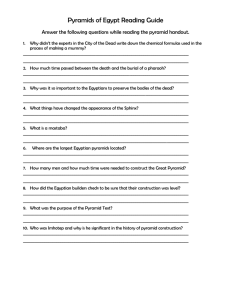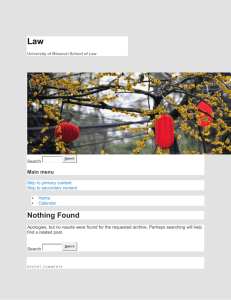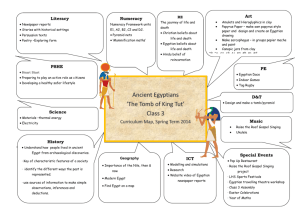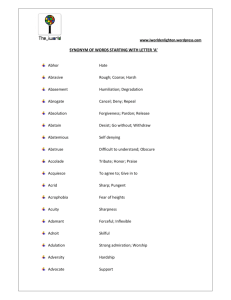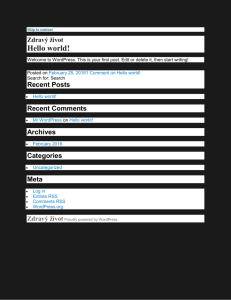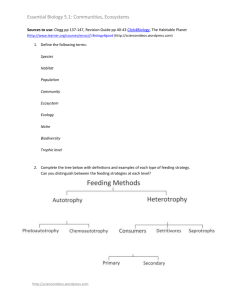Ancient Egypt Lapbook - Practical Pages
advertisement
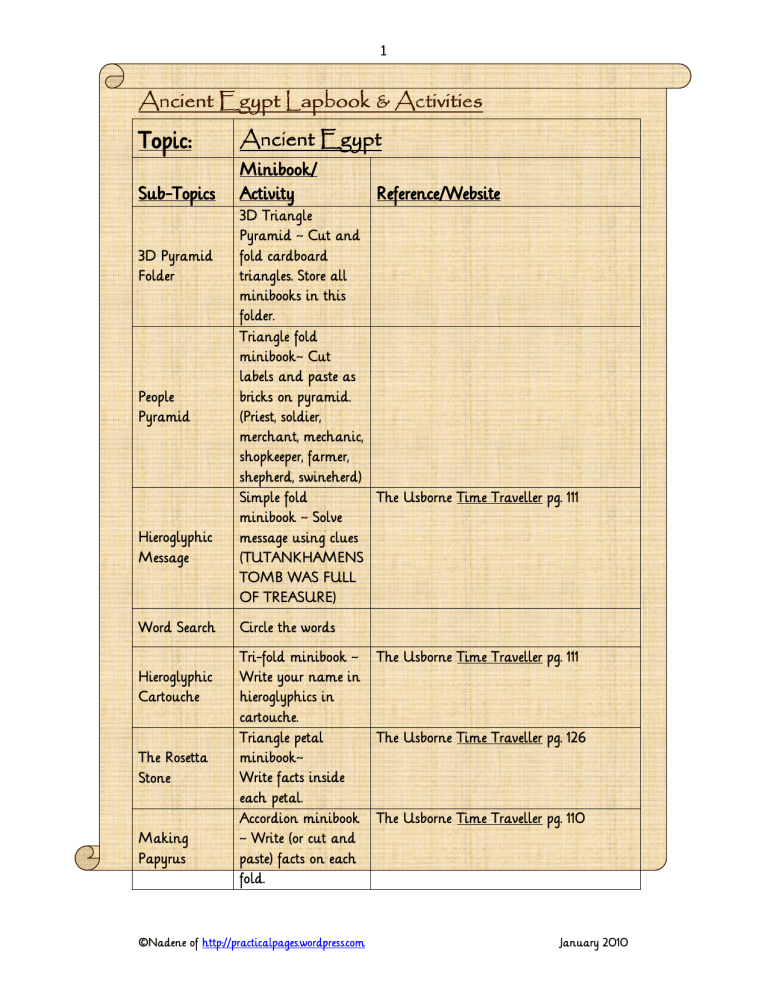
1 Ancient Egypt Lapbook & Activities Topic: Ancient Egypt Minibook/ Minibook/ SubSub-Topics Topics Activity Reference/Website Reference/Website 3D Triangle Pyramid ~ Cut and 3D Pyramid fold cardboard Folder triangles. Store all minibooks in this folder. Triangle fold minibook~ Cut labels and paste as People bricks on pyramid. Pyramid (Priest, soldier, merchant, mechanic, shopkeeper, farmer, shepherd, swineherd) Simple fold The Usborne Time Traveller pg. 111 minibook ~ Solve Hieroglyphic message using clues Message (TUTANKHAMENS TOMB WAS FULL OF TREASURE) Word Search Circle the words Tri-fold minibook ~ Hieroglyphic Write your name in Cartouche hieroglyphics in The Usborne Time Traveller pg. 111 cartouche. Triangle petal The Rosetta minibook~ Stone Write facts inside The Usborne Time Traveller pg. 126 each petal. Accordion minibook Making ~ Write (or cut and Papyrus paste) facts on each The Usborne Time Traveller pg. 110 fold. ©Nadene of http://practicalpages.wordpress.com January 2010 2 Egyptian Tab minibook~ The Usborne Time Traveller pg. 120 Burial explain each step to The Usborne Book of World History pg.18 prepare the body for http://en.wikipedia.org/wiki/Embalmed burial http://en.wikipedia.org/wiki/ Egyptian_mummification Egyptian Food Colouring Picture Puzzle King Circle Accordion The Usborne Book of World History pg.17 minibook ~ Draw The Usborne Time Traveller pg. 106 the food and drinks The Usborne book of Living Long Ago served at feast. pg.52-53 Pictures to colour in, cut out and glue pieces as puzzle. Notebook page Tutankhamen Biography Other hands- Bake bread in on ideas pottery pots and season with honey Make model of shed/ home in shoe box Make pyramid shaped model Make doll mummy for burial Make water clock Make a shaduf Biography Notebook page ©Nadene of http://practicalpages.wordpress.com http://en.wikipedia.org/wiki/Tutankhamun January 2010 3 To Make a 3D Pyramid: Print this on cardboard Score the lines Fold to make a 3D pyramid. Decorate with hieroglyphics or minibooks/drawing For large pyramid – Draw this design on A4 cardboard Cut, tape and fold. ©Nadene of http://practicalpages.wordpress.com January 2010 4 People Pyramid Cut out and fold the pyramid book and the labels of jobs/occupations and paste them on the correct levels of the pyramid. Farmers Shepherds Merchants Priests Shopkeepers Soldiers Pharaoh Swineherds Mechanics ©Nadene of http://practicalpages.wordpress.com January 2010 5 Egyptian Word Search M A B F E C A L A P D C Y A Z A E A N G Y B M D R G R F X O Z E L P C H L H B C L E O P A T R A E W P S A V I L Z O K U W R M G Q N C T F L J K E E L I N U T J O E G T J S V F K D C O S M Y T WORD LIST CLEOPATRA MARC ANTONY CAESAR PTOLEMY ASP BARGE FIGS NILE Q U E E N A E P N Y X P EGYPT QUEEN W A G X E L P J R Y F Y B N P S I C I S N E T G Q B A R G E Y D A V H E S R F E U Q M W R O U G ©Nadene of http://practicalpages.wordpress.com JEWELRY PALACE January 2010 6 Hieroglyphics Code Names can be written across from left to right, or from right to left. Names could also be written vertically, from the top down (but not from the bottom up). Cut out tri-fold minibook as 1 piece and write your name in the cartouches. Fold sides in. ©Nadene of http://practicalpages.wordpress.com January 2010 7 Cut A B C D E out in ¢ ¤ ¥ § « piece F G H I J and ¬ µ ¶ º » K L M N O ¿ ¦ π † • P Q R S T … ‰ ‹ ‡ € U V W X Y ◊ ˘ ˜ ∞ ≠ one fold this book in middle Z ∫ € ◊ € ¢ € • π ¤ • ¬ € † ‹ ¿ ¶ ¢ ˜ ¢ ‡ « ¢ ‡ π ˘ « † ‡ ¬ ◊ ¦ ‹ « Solve this “hieroglyphic “clue Use the key to solve the message: ©Nadene of http://practicalpages.wordpress.com January 2010 ¦ 8 People could read Greek and The Rosetta Stone Demotic and the stone told the same story in both In 1799 a stone was found at languages. So the same story Rosetta in Northern Egypt. must be told in hieroglyphics There were three kinds of too. Unfortunately the writing on it. At the bottom people still couldn't work out the writing was in Greek, in the what each hieroglyph meant. middle Demotic and at the top ... hieroglyphics, demotic and Greek. Write facts inside each triangle, fold in sides. Glue here. In 1822, a Frenchman, Jean-Francois Champollion, managed to solve the code. He discovered that many of the hieroglyphs stood for a single sound. Some were for 'ideas'. As a result, archaeologists were able to read the walls and rediscover the mysteries of Egypt. ©Nadene of http://practicalpages.wordpress.com January 2010 9 Papyrus Papyrus project Making Papyrus Papyrus You need a lot of river reeds (or papyrus) Weave them together as if you were making a placemat, about half the size of a placemat. You'll need a way to anchor the vertical reeds while you weave them – use pegs on a board. Then you pound the mat flat with a rock or a hammer. Flip it over and pound the other side flat. Let it dry (you can hang them on a clothesline with clothespins) until it is not green anymore but all brown and dry. And there is your papyrus! You could also do this with strips of thick sugar paper 1/2 inch (1 cm) wide and about 11 inches (30 cm) long. After you weave them, soak the mat in water before you pound it flat on both sides and let it dry. ©Nadene of http://practicalpages.wordpress.com January 2010 10 Cut out Use the information below Egyptian Burial and write or illustrate the processes of an Egyptian burial. Cut out and staple the tab minibook at the side or bottom. Cut out Cut out Cut Cut out ©Nadene of http://practicalpages.wordpress.com out January 2010 11 Cut Cut out out In Ancient Egypt, a body was prepared for burial in a very special process to preserve the body. Embalmers removed the brain and some internal organs. They would clean the body and fill it with spices and herbs. They would cover the body with salt called natron and leave the body to dry out. Then they would wrap the body in linen bandages to make a mummy. The body would be coated with oils, and decorated with jewels and charms. A mask would be put over the face and they would wrap the body again. The mummy would be placed in a sarcophagus. This would be put into a tomb with processions needed in his afterlife. ©Nadene of http://practicalpages.wordpress.com January 2010 Glue to 1st strip 12 Egyptian Food Draw (or write) the food and drinks served at an Ancient Egyptian feast. ©Nadene of http://practicalpages.wordpress.com January 2010 Make your own puzzle! 13 Colour in the picture, and then cut out on the dotted grey lines. Now put your puzzle back together again! The Great Sphinx is one of the most famous statues in the world. ©Nadene of http://practicalpages.wordpress.com January 2010 14 Make your own puzzle! Colour in the picture, and then cut out on the dotted grey lines. Now put your puzzle back together again! Statue of Pharaoh Tuthmosis III, 18th dynasty was found at Karnak. ©Nadene of http://practicalpages.wordpress.com January 2010 Make your own puzzle! 15 Colour in the picture, and then cut out on the dotted grey lines. Now put your puzzle back together again! A painting of Ramesses II. ©Nadene of http://practicalpages.wordpress.com January 2010 16 King Tutankhamen King Tutankhamen Reign 1333–1324 BCE, 18th Dynasty He is depicted only once as a prince, on a block from Hermopolis, where he is called Tutankwhaten in Egyptian hieroglyphs is: (Ref: http://en.wikipedia.org/wiki/Tuta nkhamun) ©Nadene of http://practicalpages.wordpress.com January 2010

